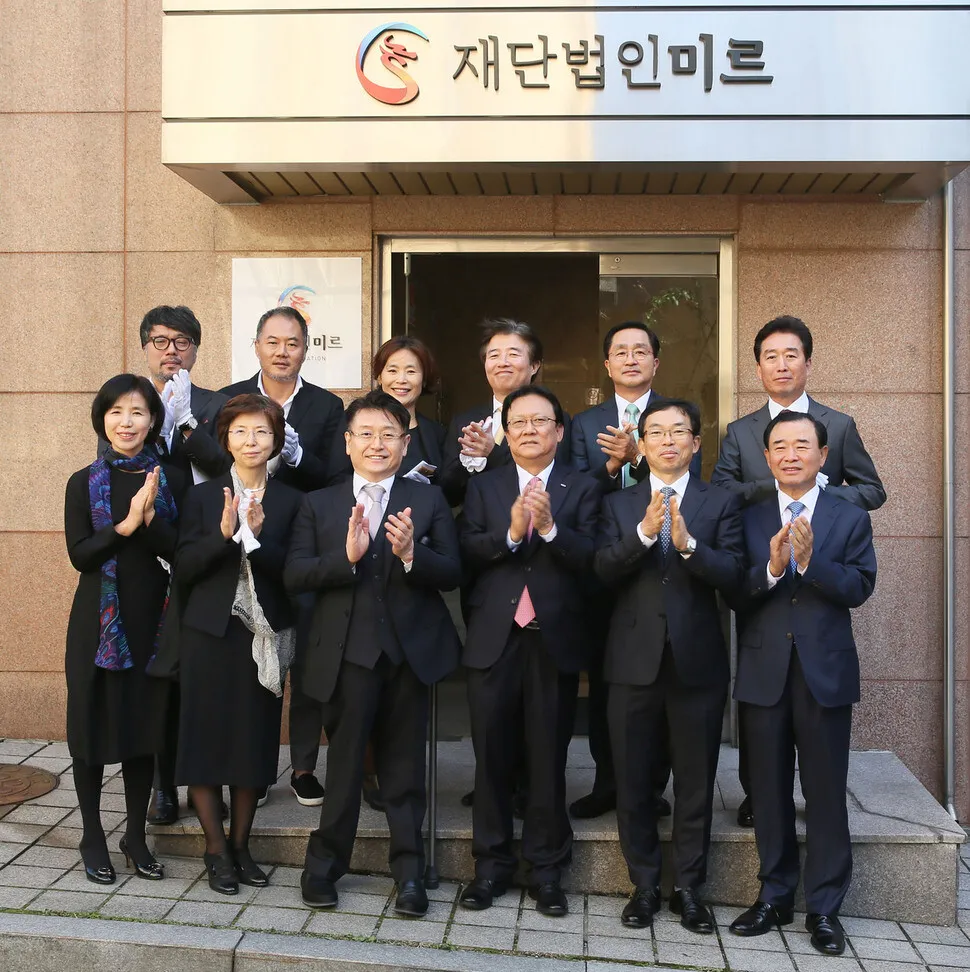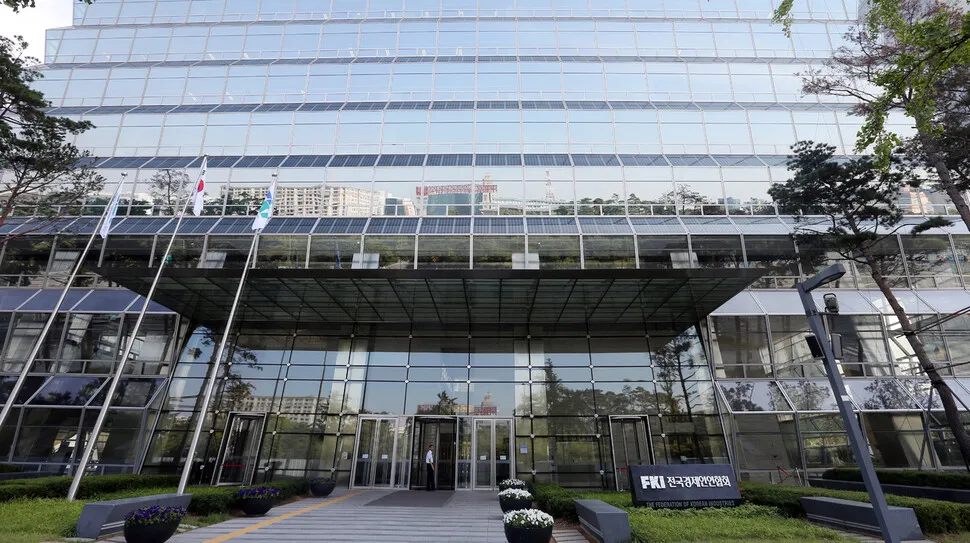hankyoreh
Links to other country sites 다른 나라 사이트 링크
[Analysis] Federation of Korean Industries in crisis over improper relations with the government

Implicated in a string of allegations about improper relations with the government, the Federation of Korean Industries (FKI), a lobby for the owners of South Korea’s chaebols, or large family-run conglomerates, is facing a grave crisis. Not long after it was involved in a humiliating controversy about supporting the Korea Parent Federation, a right-wing organization, the FKI is now at the center of allegations about the establishment of the Mir Foundation and the K-Sports Foundation. Some are even calling for the FKI to be shut down.
The FKI is a business association that was set up by the chaebol after the 1961 coup that brought Park Chung-hee to power. From its very outset, the FKI had close ties with the government. During the military dictatorship and the development period from the 1960s to the 1980s, the FKI’s role was to raise money for political campaigns and to distribute these funds to politicians.
At the same time, the FKI served to voice the business world‘s view on economic policy, earning it the moniker of “the hub of big business.” The organization gained prestige by arranging major negotiations shortly after the Asian financial crisis in the late 1990s. More recently, however, this prestige has been running out, and the organization has become the subject of gossip.
Over the past year, the FKI has been embroiled in accusations about its political ties on no fewer than three occasions. When the administration of President Park Geun-hye moved to monopolize the authorship of Korean history textbooks last year, the Center for Free Enterprise (CFE), which had become an affiliate of the FKI, launched a public relations campaign in favor of government authorship of the textbooks. The CFE claimed to be an independent nonprofit when it got involved the textbook debate, but in November of last year it was accused of receiving an average of 2 billion won (US$1.81 million) a year in funding from the FKI.

The scandal in April of this year about the FKI’s support for the Korea Parent Federation also reinforced suspicions that the FKI was meddling in politics. This scandal was triggered by the revelation that the FKI had wired more than 500 million won to borrowed-name accounts controlled by the Korea Parent Federation, which was actively involved in pro-government demonstrations and opposition to a thorough investigation into the sinking of the Sewol ferry.
Each time it gets into trouble, the FKI feigns innocence instead of admitting its wrongdoing and showing some regret, and it also tries to cover for the Blue House.
“Not only companies but also the Blue House agreed about the need for the foundations. It was at that time that several companies voiced their opinions, and the FKI took the lead in doing the work necessary to set up the two foundations,” said Lee Seung-cheol, vice chairman of the FKI, during a meeting with reporters and executives on Sep. 23. At the same meeting, Lee denied allegations that the Blue House was involved in the Mir Foundation and the K-Sports Foundation.
“Since the Federation of Korean Industries is giving money to the Korea Parent Federation and contributing to the president’s retirement fund, it can no longer be regarded as a business organization. The Federation is a hotbed of improper relations between business and government and a major culprit in graft and corruption, and the time has come to shut it down,” said Shim Sang-jung, leader of the Justice Party.
“What does promoting free enterprise have to do with twisting the arms of companies that are struggling with the economic downturn to make them cough up money and boasting about one’s influence with the current government by raising 77.4 billion won from chaebol in two weeks?” said Jang Jin-yeong, spokesperson for the People’s Party, in a statement.
Skepticism about the FKI is also increasing among chaebol. Every time accusations have been raised about inappropriate relations with the government, the FKI has promised to clean house and increase transparency, but it has never followed through with the promised changes. The scandals that have occurred over the past year also show that the organization is probably incapable of reforming on its own.
GS Group chairman Huh Chang-soo is serving as the FKI chairman for the third time in a row, reflecting the chaebol’s reluctance to fill the position. “The FKI does not adequately represent the interest of the chaebol; if anything, it’s becoming a burden. The organization is a vestige of ‘development dictatorship’ since it was set up under the military dictatorship of Park Chung-hee. We are seeing its limitations in a changing era,” said a senior executive at one of South Korea’s top four chaebol.
“The FKI seems to have completed its original mission as a chaebol lobby group. It needs to find a way to serve the interest of the national economy as a whole,” said a former FKI executive.
By Kwack Jung-soo, business correspondent
Please direct questions or comments to [english@hani.co.kr]

Editorial・opinion
![[Editorial] Abandoned appeal in 2019 lawmaker clash case raises questions about prosecutors’ standards [Editorial] Abandoned appeal in 2019 lawmaker clash case raises questions about prosecutors’ standards](https://flexible.img.hani.co.kr/flexible/normal/500/300/imgdb/original/2025/1128/1817643173126142.jpg) [Editorial] Abandoned appeal in 2019 lawmaker clash case raises questions about prosecutors’ standards
[Editorial] Abandoned appeal in 2019 lawmaker clash case raises questions about prosecutors’ standards![[Column] The origins of China’s real estate bubble [Column] The origins of China’s real estate bubble](https://flexible.img.hani.co.kr/flexible/normal/500/300/imgdb/original/2025/1127/3717642304508069.jpg) [Column] The origins of China’s real estate bubble
[Column] The origins of China’s real estate bubble- [Editorial] Was Yoon’s wife pulling the strings of those investigating her?
- [Column] Has Korean society become any safer since the martial law crisis?
- [Column] Japan’s quandary in the ‘new type of great power relations’
- [Editorial] Yoon proves himself a coward and a fool in court
- [Column] A prospect more worrying than a Korean Peninsula sans US
- [Column] There’s no solving the feud between Japan and China
- [Correspondent’s column] Goodbye MAGA, hello affordability?
- [Editorial] PPP lawmakers get slap on the wrist for violent violation of legislative procedure
Most viewed articles
- 1What’s really driving the drastic depreciation of Korea’s won
- 2Korean industries reeling on surging won-dollar exchange rate
- 3Korea sinks further into trade deficit with China amid inaction from government
- 4Won’s real effective exchange rate plummets to lowest level since 2009 financial crisis
- 5[Column] Russia and China’s golden ticket to destabilizing the dollar
- 685% of major Korean firms say political uncertainty could fuel exchange rate woes
- 7S. Korea, China renew their currency swap for additional five years to an increased US$59 billion
- 8Korea records first trade deficit with China since 1992
- 9Value of Korean won down 7.3% in 2024, a steeper plunge than during 2008 crisis
- 10[News analysis] The double-sided nature of South Korea’s growing diplomatic influence